- Home
- Deborah Harkness
Shadow of Night: A Novel Page 25
Shadow of Night: A Novel Read online
Page 25
“I should go. We’re setting out early tomorrow.” I turned to leave, then whirled around and flung my arms around Philippe’s massive shoulders. How could such a man ever be broken?
“What is it?” Philippe murmured, taken aback.
“You will not be alone either, Philippe de Clermont,” I whispered fiercely. “I’ll find a way to be with you in the darkness, I promise. And when you think the whole world has abandoned you, I’ll be there, holding your hand.”
“How could it be otherwise,” Philippe said gently, “when you are in my heart?”
***
The next morning only a few creatures were gathered in the courtyard to send us on our way. Chef had tucked all sorts of snacks for me into Pierre’s saddlebags, and Alain had stuffed the rest of the available space with letters for Gallowglass, Walter, and scores of other recipients. Catrine stood by, eyes puffy with crying. She had wanted to go with us, but Philippe wouldn’t allow it.
And there was Philippe, who gathered me up in a bear hug before letting me go. He and Matthew spoke quietly for a few moments. Matthew nodded.
“I am proud of you, Matthaios,” said Philippe, clasping him briefly on the shoulder. Matthew moved slightly toward his father when Philippe released him, reluctant to break the connection.
When Matthew turned to me, his face was resolute. He helped me into the saddle before swinging effortlessly onto the back of his horse.
“Khaire, Father,” Matthew said, eyes gleaming.
“Khairete, Matthaios kai Diana,” Philippe replied.
For Matthew there was no turning for a last glimpse of his father and no softening of the stiffness in his back. He kept his eyes on the road ahead, facing the future rather than the past.
I turned once, when a flash of movement caught my eye. It was Philippe, riding along a neighboring ridge, determined not to let go of his son until it was necessary.
“Good-bye, Philippe,” I whispered into the wind, hoping that he would hear.
14
“Ysabeau? Are you all right?”
“Of course.” Ysabeau was bending back the covers on a priceless old book and shaking it upside down.
Emily Mather looked at Ysabeau doubtfully. The library was in a state of utter chaos. The rest of the château was neat as a pin, but this room looked as if a tornado had blown through it. Books were strewn everywhere. Someone had pulled them off the shelves and flung them onto every other available surface.
“It must be here. He would have known that the children were together.” Ysabeau flung the book aside and reached for another. It pained Emily to her librarian’s soul to see books mistreated like this.
“I don’t understand. What are you looking for?” She picked up the discarded volume and closed it gently.
“Matthew and Diana were going to 1590. I was not at home then, but in Trier. Philippe would have known about Matthew’s new wife. He would have left me word.” Ysabeau’s hair hung down around her face and flowed nearly to her waist. Impatiently she took it in her hands and twisted it out of her way. After examining the spine and pages of her latest victim, she sliced open the end paper with the sharp nail of her index finger. Finding nothing hidden there, she growled with frustration.
“But these are books, not letters,” Emily said carefully. She didn’t know Ysabeau well, but Emily was well acquainted with the more gruesome legends about Matthew’s mother and what she had done in Trier and other places. The matriarch of the de Clermont family was no friend to witches, and even though Diana trusted the woman, Emily was still not sure.
“I am not looking for a letter. We hid little notes to each other in the pages of books. I searched through every volume in the library when he died, wanting to have every last piece of him. But I must have missed something.”
“Maybe it wasn’t there to be found—not then.” A dry voice spoke from the shadows by the door. Sarah Bishop’s red hair was wild and her face white with worry and lack of sleep. “Marthe is going to have a fit when she sees this. And it’s a good thing Diana isn’t around. She’d give you a lecture on book preservation that would bore you stupid.” Tabitha, who accompanied Sarah everywhere, shot from between the witch’s legs.
It was Ysabeau’s turn to be confused. “What do you mean, Sarah?”
“Time is tricky. Even if everything went according to plan and Diana took Matthew back to the first day of November in 1590, it may still be too soon to look for a message from your husband. And you wouldn’t have found a message before, because Philippe hadn’t met my niece yet.” Sarah paused. “I think Tabitha’s eating that book.”
Tabitha, delighted to be in a house with an ample supply of mice and plenty of dark corners for hiding, had recently taken to climbing the furniture and the drapes. She was perched on one of the library shelves, gnawing on the corner of a leather-bound volume.
“Kakó gati!” Ysabeau cried, rushing over to the shelves. “That is one of Diana’s favorites.”
Tabitha, who had never backed down from a confrontation with another predator with the exception of Miriam, swiped at the book so that it fell to the floor. She jumped down after it, hovering over her prize like a lion guarding a particularly desirable treat.
“It’s one of those alchemy books with pictures in it,” Sarah said, liberating the book from her cat and flipping through the pages. She gave the cover a sniff. “Well, no wonder Tabitha wants to chew on it. It smells of mint and leather, just like her favorite toy.”
A square of paper, folded and folded and folded again, fluttered to the floor. Deprived of the book, Tabitha picked up the paper between her sharp teeth and stalked toward the door.
Ysabeau was waiting for her. She picked Tabitha up by the scruff of the neck and pried the paper from the cat’s mouth. Then she kissed the surprised feline on the nose. “Clever cat. You will have fish for supper.”
“Is that what you were looking for?” Emily eyed the scrap. It didn’t seem worth tearing the room apart.
Ysabeau’s answer was clear from the way she handled it. She carefully unfolded it to reveal a five-inch square of thick paper, both sides covered in tiny characters.
“That’s written in some kind of code,” said Sarah. She swung her zebra-striped reading glasses onto her nose from the cord around her neck to get a better look.
“Not a code—Greek.” Ysabeau’s hands trembled as she smoothed the paper flat.
“What does it say?” Sarah asked.
“Sarah!” Emily scolded. “It’s private.”
“It’s from Philippe. He saw them,” Ysabeau breathed, her eyes racing across the text. Her hand went to her mouth, relief vying with disbelief.
Sarah waited for the vampire to finish reading. It took two minutes, which was ninety seconds longer than she would have given anyone else. “Well?”
“They were with him for the holidays. ‘On the morning of the Christians’ holy celebration, I said farewell to your son. He is happy at last, mated to a woman who walks in the footsteps of the goddess and is worthy of his love,’” Ysabeau read aloud.
“Are you sure he means Matthew and Diana?” Emily found the phrasing oddly formal and vague for an exchange between husband and wife.
“Yes. Matthew was always the child we worried over, though his brothers and sisters got into far worse predicaments. My one wish was to see Matthew happy.”
“And the reference to the ‘woman who walks in the footsteps of the goddess’ is pretty clear,” Sarah agreed. “He couldn’t very well give her name and identify Diana as a witch. What if someone else had found it?”
“There is more,” Ysabeau continued. “‘Fate still has the power to surprise us, bright one. I fear there are difficult times ahead for all of us. I will do what I can, in what time remains to me, to ensure your safety and that of our children and grandchildren, those whose blessings we already enjoy and those as yet unborn.’”
Sarah swore. “Unborn, not unmade?”
“Yes,” Ysabeau whispered. “
Philippe always chose his words carefully.”
“So he was trying to tell us something about Diana and Matthew,” Sarah said.
Ysabeau sank onto the sofa. “A long, long time ago, there were rumors about creatures who were different—immortal but powerful, too. Around the time the covenant was first signed, some claimed that a witch gave birth to a baby who wept tears of blood like a vampire. Whenever the child did so, fierce winds blew in from the sea.”
“I’ve never heard that before,” Emily said, frowning.
“It was dismissed as a myth—a story created to engender fear among creatures. Few among us now would remember, and even fewer would believe it possible.” Ysabeau touched the paper in her lap. “But Philippe knew it was true. He held the child, you see, and knew it for what it was.”
“Which was what?” Sarah said, stunned.
“A manjasang born of a witch. The poor child was starving. The witch’s family took the baby boy from her and refused to feed him blood on the grounds that if he was forced to take only milk, it would keep him from turning into one of us.”
“Surely Matthew knows this story,” Emily said. “You would have told him for his research, if not for Diana’s sake.”
Ysabeau shook her head. “It was not my tale to tell.”
“You and your secrets,” Sarah said bitterly.
“And what of your secrets, Sarah?” Ysabeau cried. “Do you really believe that the witches—creatures like Satu and Peter Knox—know nothing about this manjasang child and its mother?”
“Stop it, both of you,” Emily said sharply. “If the story is true, and other creatures know it, then Diana is in grave danger. Sophie too.”
“Her parents were both witches, but she is a daemon,” Sarah said, thinking of the young couple who had appeared on her doorstep in New York days before Halloween. No one understood how the two daemons fit into this mystery.
“So is Sophie’s husband, but their daughter will be a witch. She and Nathaniel are further proof that we don’t understand how witches, daemons, and vampires reproduce and pass their abilities on to their children,” Emily said, worried.
“Sophie and Nathaniel aren’t the only creatures who need to stay clear of the Congregation. It’s a good thing Matthew and Diana are safely in 1590 and not here.” Sarah was grim.
“But the longer those two stay in the past, the more likely it is they’ll change the present,” Emily observed. “Sooner or later, Diana and Matthew will give themselves away.”
“What do you mean, Emily?” asked Ysabeau.
“Time has to adjust—and not in the melodramatic way people think, with wars averted and presidential elections changed. It will be little things, like this note, that pop up here and there.”
“Anomalies,” Ysabeau murmured. “Philippe was always looking for anomalies in the world. It is why I still read all the newspapers. It became our habit to look through them each morning.” Her eyes closed against the memory. “He loved the sports section, of course, and read the education columns as well. Philippe was worried about what children would learn in the future. He established fellowships for the study of Greek and philosophy, and he endowed colleges for women. I always thought it strange.”
“He was looking for Diana,” Emily said with the certainty of someone blessed with second sight.
“Perhaps. Once I asked him why he was so preoccupied with current events and what he hoped to discover in the papers. Philippe said he would know it when he saw it,” Ysabeau replied. She smiled sadly. “He loved his mysteries and said if it were possible, he would like to be a detective, like Sherlock Holmes.”
“We need to make sure we notice any of these little time bumps before the Congregation does,” said Sarah.
“I will tell Marcus,” Ysabeau agreed with a nod.
“You should have told Matthew about that mixed-species baby.” Sarah was unable to keep the note of recrimination from her voice.
“My son loves Diana, and if he had known about that child, Matthew would have turned his back on her rather than put her—and the baby—in danger.”
“Bishops aren’t so easily cowed, Ysabeau. If Diana wanted your son, she would have found a way to have him.”
“Well, Diana did want him, and they have each other now,” Emily pointed out. “But we’re not going to have to share this news only with Marcus. Sophie and Nathaniel have to know, too.”
Sarah and Emily left the library. They were staying in Louisa de Clermont’s old room, down the hall from Ysabeau. Sarah thought there were times of day when it smelled a bit like Diana.
Ysabeau remained after they’d gone, gathering up books and reshelving them. When the room was orderly once again, she returned to the sofa and picked up the message from her husband. There was more to it than she had revealed to the witches. She reread the final lines.
“But enough of these dark matters. You must keep yourself safe, too, so that you can enjoy the future with them. It has been two days since I reminded you that you hold my heart. I wish that I could do so every moment, so that you do not forget it, or the name of the man who will cherish yours forevermore. Philipos.”
In the last days of his life, there had been moments when Philippe couldn’t remember his own name, let alone hers.
“Thank you, Diana,” Ysabeau whispered into the night, “for giving him back to me.”
Several hours later, Sarah heard a strange sound overhead—like music, but more than music. She stumbled out of the room to find Marthe in the hall, wrapped in an old chenille bathrobe with a frog embroidered on the pocket, a bittersweet expression on her face.
“What is that?” Sarah asked, looking up. Nothing human could hope to produce a sound that beautiful and poignant. There must be an angel on the roof.
“Ysabeau is singing again,” Marthe answered. “She has only done so once since Philippe died—when your niece was in danger and needed to be pulled back into this world.”
“Is she all right?” There was so much grief and loss in every note that Sarah’s heart constricted. There weren’t words to describe the sound.
Marthe nodded. “The music is a good thing, a sign that her mourning may at last be coming to an end. Only then will Ysabeau begin to live again.”
Two women, vampire and witch, listened until the final notes of Ysabeau’s song faded into silence.
PART III
London:
The Blackfriars
15
“It looks like a demented hedgehog,” I observed. The London skyline was filled with needlelike spires that stuck up from the huddle of buildings that surrounded them. “What is that?” I gasped, pointing to a vast expanse of stone pierced by tall windows. High above the wooden roof was a charred, stout stump that made the building’s proportions look all wrong.
“St. Paul’s,” Matthew explained. This was not Christopher Wren’s graceful white-domed masterpiece, its bulk concealed until the last moment by modern office blocks. Old St. Paul’s, perched on London’s highest hill, was seen all at once.
“Lightning struck the spire, and the wood of the roof caught fire. The English believe it was a miracle the entire cathedral didn’t burn to the ground,” he continued.
“The French, not surprisingly, believe that the hand of the Lord was evident somewhat earlier in the event,” commented Gallowglass. He had met us at Dover, commandeered a boat in Southwark, and was now rowing us all upstream. “No matter when God showed His true colors, He hasn’t provided money for its repair.”
“Nor has the queen.” Matthew devoted his attention to the wharves on the shoreline, and his right hand rested on the hilt of his sword.
I had never imagined that Old St. Paul’s would be so big. I gave myself another pinch. I had been administering them since spotting the Tower (it, too, looked enormous without skyscrapers all around) and London Bridge (which functioned as a suspended shopping mall). Many sights and sounds had impressed me since our arrival in the past, but nothing had taken my breath
away like my first glimpses of London.
“Are you sure you don’t want to dock in town first?” Gallowglass had been dropping hints about the wisdom of this course of action since we’d climbed into the boat.
“We’re going to the Blackfriars,” Matthew said firmly. “Everything else can wait.”
Gallowglass looked dubious, but he kept rowing until we reached the westernmost reaches of the old, walled city. There we docked at a steep set of stone stairs. The bottom treads were submerged in the river, and from the look of the walls the tide would continue to rise until the rest were underwater, too. Gallowglass tossed a line to a brawny man who thanked him profusely for returning his property in one piece.
“You seem only to travel in other people’s boats, Gallowglass. Maybe Matthew should give you your own for Christmas,” I said drily. Our return to England—and the old calendar—meant we were celebrating the holiday twice this year.
“And deprive me of one of my few pleasures?” Gallowglass’s teeth showed in his beard. Matthew’s nephew thanked the boatman and tossed him a coin the size and weight of which reduced the poor fellow’s previous anxiety to a hazy glow of appreciation.
We passed from the landing through an archway and onto Water Lane, a narrow, twisting artery crowded with houses and shops. With every rising floor, the houses jutted farther over the street, like a clothes chest with the upper drawers pulled out. This effect was heightened by the linens, carpets, and other items hanging out the windows. Everyone was taking advantage of the unusually fine weather to air out lodgings and garments.
Matthew retained a firm grip on my hand, and Gallowglass walked to my right. Sights and sounds came at us from every direction. Fabrics in saturated red, green, brown, and gray swung from hips and shoulders as skirts and cloaks were twitched away from wagon wheels and caught on the packages and weapons carried by passersby. The ring of hammers, the neighing of horses, the distant lowing of a cow, and the sound of metal rolling on stone competed for attention. Dozens of signs bearing angels, skulls, tools, brightly colored shapes, and mythological figures swayed and squeaked in the wind that blew up from the water. Above my head a wooden sign swung on its metal rod. It was decorated with a white deer, its delicate antlers circled with a golden band.

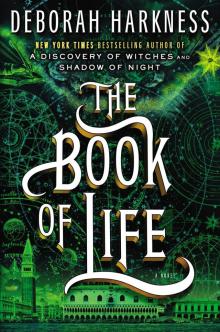 The Book of Life
The Book of Life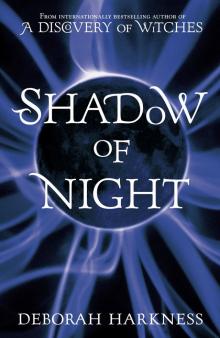 Shadow of Night
Shadow of Night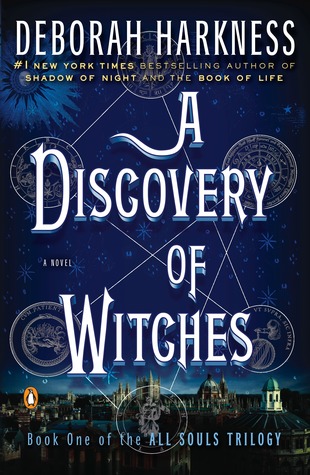 A Discovery of Witches
A Discovery of Witches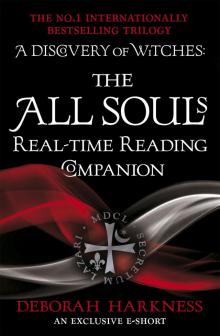 The All Souls Real-Time Reading Companion
The All Souls Real-Time Reading Companion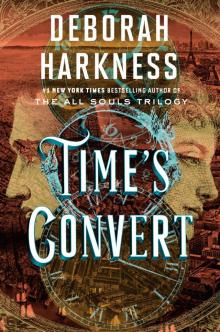 Time's Convert
Time's Convert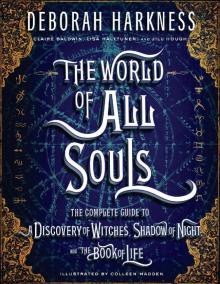 The World of All Souls
The World of All Souls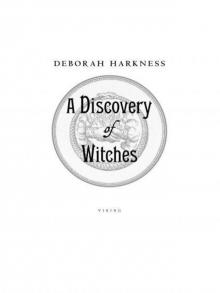 A Discovery of Witches: A Novel (All Souls Trilogy)
A Discovery of Witches: A Novel (All Souls Trilogy)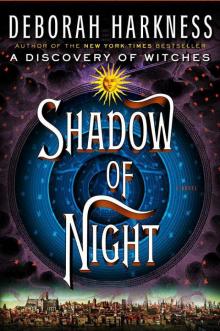 Shadow of Night: A Novel
Shadow of Night: A Novel